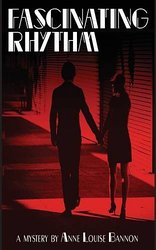 Relevant History welcomes Anne Louise Bannon, an author and journalist who wrote her first novel at age fifteen. Her journalistic work has appeared in magazines and newspapers across the country. She was a TV critic for over ten years, and created the Odd Ball Grape wine education blog with her husband, Michael Holland. She also writes the romantic fiction serial White House Rhapsody. She is the co-author of Howdunit: Book of Poisons with Serita Stevens, as well as mysteries Fascinating Rhythm, Bring Into Bondage, and Tyger, Tyger. She and her husband live in Southern California with an assortment of critters. To learn more about her and her books, visit her web site, and follow her on Facebook, Twitter, Google+, and Pinterest.
Relevant History welcomes Anne Louise Bannon, an author and journalist who wrote her first novel at age fifteen. Her journalistic work has appeared in magazines and newspapers across the country. She was a TV critic for over ten years, and created the Odd Ball Grape wine education blog with her husband, Michael Holland. She also writes the romantic fiction serial White House Rhapsody. She is the co-author of Howdunit: Book of Poisons with Serita Stevens, as well as mysteries Fascinating Rhythm, Bring Into Bondage, and Tyger, Tyger. She and her husband live in Southern California with an assortment of critters. To learn more about her and her books, visit her web site, and follow her on Facebook, Twitter, Google+, and Pinterest.
*****
It’s hard to tell the behind-the-scenes story of my latest novel Bring Into Bondage without mentioning the book that came before it, Fascinating Rhythm. The books are set in the 1920s and feature editor Kathy Briscow and her socialite author boyfriend Freddie Little. In Fascinating Rhythm, we find out that Kathy comes from Hays, Kansas, a small farming town pretty much dead center in the country, which in turn becomes the setting for Bring Into Bondage.
I purposely chose a rural town for Kathy’s original home. Right after World War I, the country started urbanizing, and as of the 1920 census, just over half the U.S. population lived in cities for the first time ever. Barely fifty years before, only five percent of the population had. One of the hot tunes from that post-Great War era was “How You Gonna Keep ‘Em Down on the Farm (After They’ve Seen Paree?)” It was not only happening, it was on people’s minds. So it made sense that my feisty office worker came from a rural background.
I didn’t realize it at the time, but it was a far richer background than I thought. Okay, I did know, in a vague, “they said so in history class” kind of way that what we know as The Great Depression actually started for American farmers shortly after the end of World War I. But what caused the farming depression, namely debt, became one of the underlying themes in Bring Into Bondage, which is set on the farm belonging to Kathy’s parents.
There were a lot of different causes, but basically, farmers were caught in a spiral of producing too much, which caused crop prices to fall, then having to produce more to make up for it, causing crop prices to fall still lower. Frederick Lewis Allen, in his short history of the decade, Only Yesterday, partially laid the blame on mechanization. But other sources have also pointed out that the farmers had seen a boom in crop prices during the Great War, when not only did they feed the U.S., they exported crops to war-torn Europe. Once the war was over, so was the need for imported food. Which meant an even larger supply in the U.S. In any case, what caused the larger part of farmers’ problems was that they took out mortgages to either buy more land or to buy the new mechanical equipment.
Farming has never been easy. But in the 1920s, there were no subsidies and no other social safety nets. You relied on your neighbors, as Kathy’s family does, even though the family farm is under attack by mysterious vandals. Freddie mentally refers to Kathy’s family as being dirt poor. There’s a sense of frugality in this family that we don’t recognize today in our abundant, throw-away culture. When Ma Briscow sends the five-word telegram to summon Kathy home, Kathy is upset because Ma uses two words she didn’t need. Telegrams cost five cents per word, and to carelessly spend ten cents when every penny counts means Ma is very upset indeed.
The title of the book comes from the biblical book Nehemiah (5:5), in which some of the Israelites are complaining that they can’t get justice for their children, who have been sold into bondage, because other men have their lands. In short, they have been mortgaged out to the hilt and are now in bondage, themselves. Kind of like farmers in Kansas were in the 1920s.
*****
 A big thanks to Anne Louise Bannon. She’ll give away a copy of Fascinating Rhythm to someone who contributes a comment on my blog this week. I’ll choose the winner from among those who comment by Friday at 6 p.m. ET. Delivery is available worldwide for an ebook and in the U.S. only for a trade paperback.
A big thanks to Anne Louise Bannon. She’ll give away a copy of Fascinating Rhythm to someone who contributes a comment on my blog this week. I’ll choose the winner from among those who comment by Friday at 6 p.m. ET. Delivery is available worldwide for an ebook and in the U.S. only for a trade paperback.
**********
Did you like what you read? Learn about downloads, discounts, and special offers from Relevant History authors and Suzanne Adair. Subscribe to Suzanne’s free newsletter.
